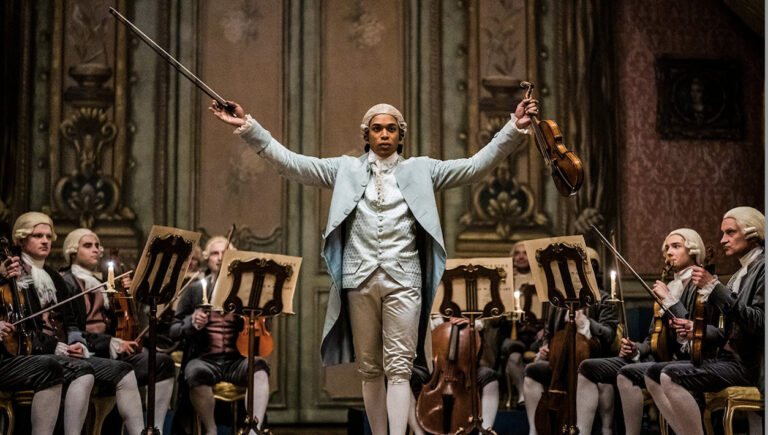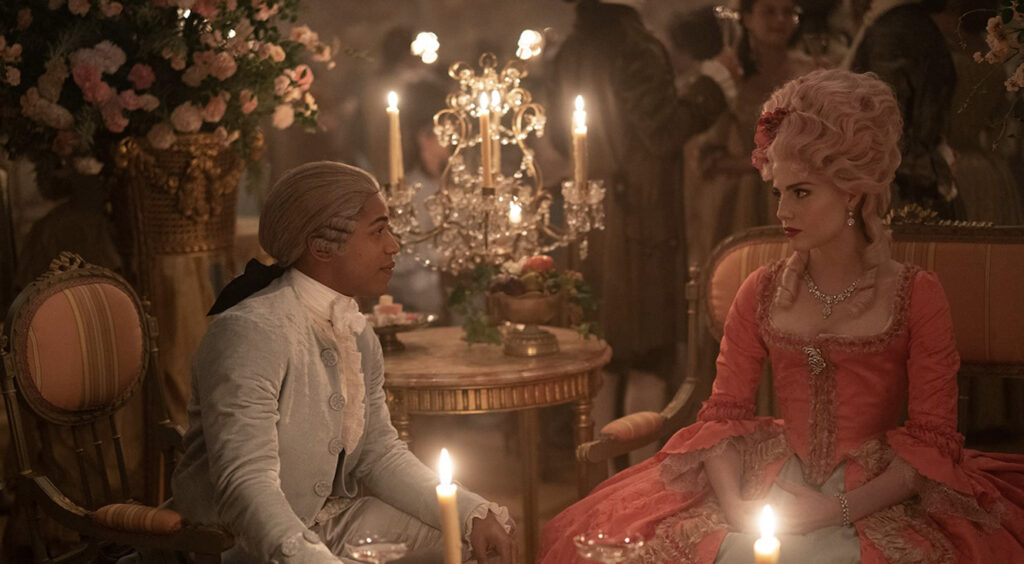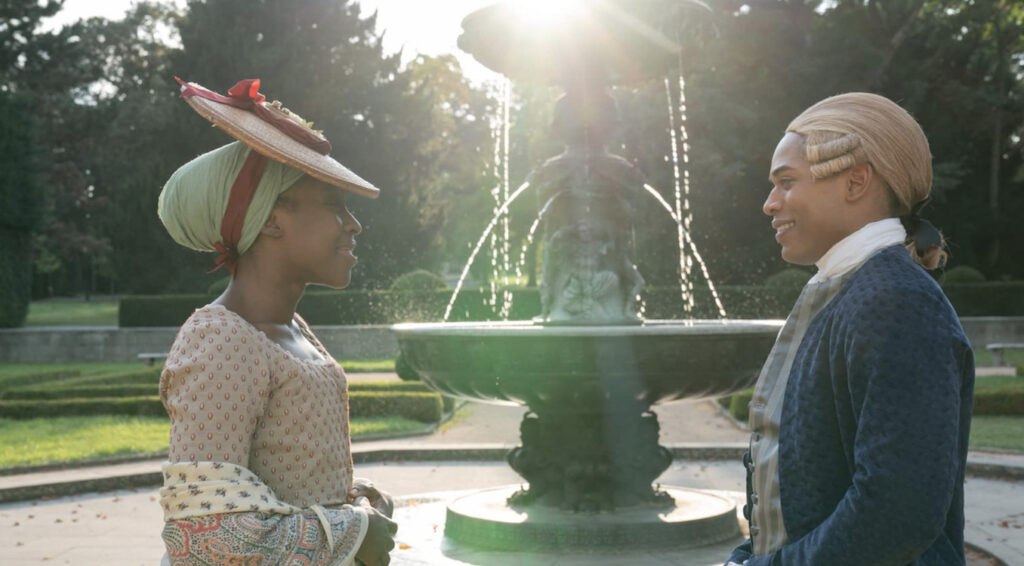
Synopsis : Inspired by the incredible true story of composer Joseph Bologne, Chevalier de Saint-Georges. The illegitimate son of an African slave and a French plantation owner, Bologne (Kelvin Harrison Jr. in a tour de force performance) rises to improbable heights in French society as a celebrated violinist-composer and fencer, complete with an ill-fated love affair and a falling out with Marie Antoinette (Lucy Boynton) and her court.
Rating: PG-13 (Thematic Content|Suggestive Material|Some Strong Language|Violence)
Genre: Biography, History, Drama, Music
Original Language: English
Director: Stephen Williams
Producer: Ed Guiney, Andrew Lowe, Dianne McGuigle, Stephani Robinson
Writer: Stephani Robinson
Release Date (Theaters): Wide
Runtime:
Distributor: Searchlight Pictures
Production Co: Stillking Films, Searchlight Pictures, Element Pictures

Exclusive Interview with Director Stephen Willams
Q: I heard that Kelvin Harrison’s father is a classical music teacher, and Kelvin has acquired knowledge of music, and he used to hear his father’s music and stuff like that, but what was the element that you found fascinating about Kelvin that made you cast him as a lead role for this movie?
S.W : I was familiar with Kelvin Harrison Jr’s work from a number of prior movies, whether “Cyrano” or “Waves,” and it wasn’t until after I met him that I knew that his father, and his family was musical, and that he had had some prior kind of acquaintance with the world of music. But he was just someone who understood the role of Chevalier, and of Joseph Bologne, at a really intuitive level.
He also is a really hard worker. He’s dedicated. He’s committed. All the violin bowing that you see in the movie is all Kelvin. There’s no stunt doubles, there’s no cinematic trickery. It’s all a product of Kelvin having dedicated himself 6 hours a day, six months before we started shooting to learning how to play the violin. For all those reasons, he was just the perfect person to play this role.
Q: Joseph Bologne is incredibly well educated in a way that’s transgressive like musician’s like Prince or David Bowie in this era, probably. But most people don’t know about him. What was your fascination about him during the research process?
S.W: Yeah, exactly what you said. I didn’t know about Joseph Balogne. I didn’t know anything about Chevalier until I read Stefani Robinson’s amazing script about him. I got sent the script by Searchlight Pictures and started reading and couldn’t believe that I had not ever heard of someone as amazingly accomplished across so many fields of endeavor. He was not only a virtuosic violinist, but he was also a classical composer of concertos, of opera.
He was a champion fencer and equestrian marksman. The American president, John Adams, referred to him as the most accomplished man in Europe, and never had I heard of him. So just having read the script, it just sent me down an incredible rabbit hole of research to find out as much as I possibly could about him.
Q: This film is anchored very much by Joseph’s point of view, imagining what the time period had looked like and felt like. How consciously did you present that kind of element in the film?
Stephen: Yeah, very consciously. I made a very definite decision early on that I wanted to try and find a way, visually, to connect the viewer to Joseph’s subjective experience through all the narrative journey of the movie. I wanted to find a way to make the movie feel as contemporary and as culturally relevant today as Joseph’s life felt to me the more I learned about it.
Even though he was living in pre-revolutionary France in the mid to late 1700s, the more I learned about his life, the more I thought, “wow, without the wigs and without the costumes, this story could be unfolding today.” And that was the clue for me to try to find a way to photograph and find a visual grammar for the movie that made it feel not like some kind of distanced removed masterpiece theater, but something contemporary and something urgent and something present.

Q: Why do you think many people don’t know about Joseph, is that because of Napoleon?
Stephen: I think it’s certainly in part because of Napoleon. Napoleon, once he came to power after the French Revolution, he sought to suppress anybody who had had anything to do with the Royal Family prior to the revolution – and Joseph was one of those people. He was a close cohort of Marie Antoinette, and Napoleon sought to suppress information about his life and much of his music, and much of Joseph’s music has, in fact, been lost.
There is enough of it for us to assess his prowess as a classical composer and as a violinist, and a lot of his music does, in fact, appear in our movie. But certainly, that’s part of the reason. But I also think that history tends to be written by a certain group and people with a point of view. And as a result, a lot of the contributions of people from minorities or lots of other people who contribute to our collective human story tend to be either ignored, omitted, or deliberately erased.
Q: Even though this is the story about Joseph Bologne, what was amazing about this film is that the script by Stefani Robinson really captured the sensitivity of womanhood and perspective of Joseph Bologne. What was your first impression when you read the script and how did you collaborate with Stefani to narrow down what was essential because he has such a vast life?
Stephen: Yeah, you’re so right about that. His life was so rich, people could fuel six movies. What I did was try to figure out what portion of his life we felt was most important to tell, and that was his journey of self-awareness. That was his journey from a young man who initially starts out just wanting to be excellent, wanting to exert a sense of ambition and rise to the upper reaches of French society.
But as various events transpire during the course of his life and he confronts certain challenges, he starts to learn how to connect himself to his own cultural heritage and to his own specific point of view. And by the end of the movie, he is in fact standing in opposition to the Royal Family and is on the cusp of becoming part of the almost erupting French Revolution. So, it was very much about his journey. We wanted to concentrate on his journey into a place of self-awareness.
Q: This film is the story of, some part is Joseph Bologne and Marie Antoinette, but very much relies on the music and the talent of the cast members. Take us through the casting process of hiring Minnie Driver, Samara Weaving and Lucy Boynton. They are really amazing as well.
Stephen: Yeah, I’m so glad to hear you say that because I feel the same way. I think that our cast is amazing. And again, what unifies all of those performers that you mentioned is their commitment to telling this story. Minnie Driver, who has had prior experience as a singer in movies, had to work really hard to try and capture the essence of the character that she was playing, La Guimard, an opera singer. Samara Weaving did the same thing. She, in addition to having just perform the role of Marie Josephine, had to learn how to be a credible opera singer.
She spent countless hours and months working with voice coaches to learn how to do that. Lucy Boynton had the un-enviable task of playing the role of Marie Antoinette, which is a character that has been much portrayed before, but we wanted to find a different kind of take on that character and a different layer on that character, and Lucy Boynton just found a way to play that duality of the complicated relationship between being an ally of somebody and then also having to counterbalance that with all the other political and social pressures that she was forced to navigate as a young monarch. And Lucy just was incredible.
Q: Joseph was vastly known as a composer, but what was interesting about him is his transitional period when you go from musical to a soldier against the monarchy. What was your fascination about his transitional period?
Stephen: Yeah. I mean, it’s what we talked about a little bit before, which is that at a certain point when Joseph’s journey begins, I think that in his mind he was thinking of himself as an individual and he experienced himself as an outsider, as a displaced person, as a black man in in French society in the 1700s. And I think that he imagined that if he exerted a certain kind of ambition and excelled, that he would find his place in that society.
And he does to some degree. But there are limits around his sense of inclusivity in that world. And once that happens, that opens something in his consciousness where he starts to understand that there is a larger connection between himself and all the other dispossessed people who look like him and who are occupying a different social stratum than the upper reaches of French society. That politicization, that revolutionizing – not just as a literary revolutionary but also internally in terms of the way he thought about himself and his role – and that transition was of great interest to us as we made the film.
Check out more of Nobuhiro’s articles.
Here’s the trailer of the film.

